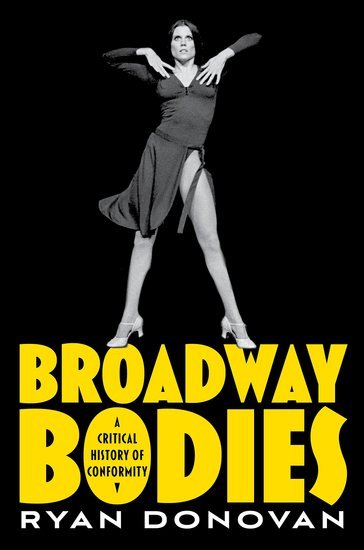BOOKS
Broadway Bodies:
A Critical History
of Conformity
Broadway has body issues.
Broadway Bodies: A Critical History of Conformity (Oxford University Press) contends that Broadway has historically treated, and continues to treat, its fictional characters better than the actors hoping to get cast in these roles. Casting is the site of power relations that most clearly reveals Broadway’s limited tolerance of difference. Today, these issues converge in the ideology of the “Broadway Body”: the hyper-fit, hyper-able, triple-threat performer who represents the ultimate commodification of the body for the Broadway economy. Casting is always a political act, situated within a power structure favoring certain kinds of bodies. On Broadway, that body has increasingly been the “Broadway Body.” Broadway Bodies focuses on exceptions to the dominant “Broadway Body.” I center how ability, sexuality, and size intersect with gender, race, and ethnicity in both casting and performance.
2024 Outstanding Book Award Association for Theatre in Higher Education
Reviews
NPR’s 2023 Books We Love: “So much of the casting for Broadway musicals depends not on voice range or mastery of dance styles, but on the height, thinness, age, color, ethnicity and lack of disability of certain bodies. Ryan Donovan, an assistant professor of theater studies at Duke, examines the history of the “Broadway Body” over the last 50 years, looking at questions like: Why do some shows use fat suits instead of casting heavier actors? Why are there so many disabled characters in musical theater and so few disabled actors? And most crucially: Is casting based on body shape/size/ethnicity/color actually crucial to the work onstage, or is it just a form of entrenched bias and legalized discrimination?” — Jennifer Vanasco, editor and reporter, Culture Desk
“Riveting...Skillfully written in sharp, crystalline prose. It requires that we ponder what it is about ourselves that we really want our American musical theatre to reflect.” — Lisa Jo Sagolla, American Theatre magazine
“Broadway Bodies is a groundbreaking addition to the intersectional fields of fat, queer, disability, race, and performance studies…Broadway Bodies, while eminently readable, is dense with sociopolitical context, historical research, and data surrounding casting practices. For those who study bodies in representation, specifically in the context of performance, this volume is a welcome contribution and is certain to serve as an anchor in this growing field.” — Jennifer-Scott Mobley, Fat Studies journal
"Ryan Donovan's fascinating and groundbreaking book explores what Broadway musical theatre hides in plain sight: bodies on stage and the politics of casting some bodies and not others. Through impeccable historical research, probing interviews, incisive performance analysis, and vivid firsthand experience, Donovan offers a new history of Broadway musicals that shines a light on the industry's troubling and often shocking casting practices. This essential-reading volume unearths how size, ability, and sexuality delimit the 'Broadway body' and mask casting's misogyny, racism, ableism, and fat phobia." — Stacy Wolf, Princeton University
"Ryan Donovan's book immediately shifts the conversation on how we talk about musical theatre. Broadway Bodies is deeply knowledgeable, politically astute, and highly readable. I loved the book's clarity and purpose—this is a must-read for theatre and performance scholars and for anyone who cares about American theatre." — David Román, University of Southern California
Enjoy the Broadway Bodies Playlist: almost 11 hours of songs from musicals covered in the book!
Queer Approaches in Musical Theatre
Queer Approaches in Musical Theatre introduces readers to a facet of musicals often assumed but misrecognized: queerness in musical theatre extends deeper than fabulosity. This volume encompasses queerness beyond familiar narratives of gay men’s presence and representation in musical theatre and introduces readers to histories of queerness in/and musicals as well as queer methods of how to study musicals. Four case studies are organized around historical context, text, production, and reception. This volume will be one of the inaugural cohort of a new series from Bloomsbury/Methuen Drama, Topics in Musical Theatre, co-edited by Robert Gordon and Emilio Méndez.
“Donovan’s scrupulous breakdown of history, text, production and public reception makes this a must-read.” — Paul Vale, Musicals magazine
Co-edited by Laura MacDonald with William Everett
Global in scope and drawing from a wide range of over fifty dance, music, and theatre scholars and practitioners, The Routledge Companion to Musical Theatre introduces the fundamentals of Musical Theatre Studies and highlights developing trends in scholarship. Investigating the Who, What, When, Where, Why, and How of musical theatre, the Companion will be the first port of call for studying musical theatre, its history, practitioners, audiences, and agendas from Broadway and the West End to Mexico City, Tokyo, and beyond. The Companion expands the study of musical theatre to include the ways we practice and experience musical theatre, the form's engagement with technology, and its navigation of global, commercial marketplaces.


